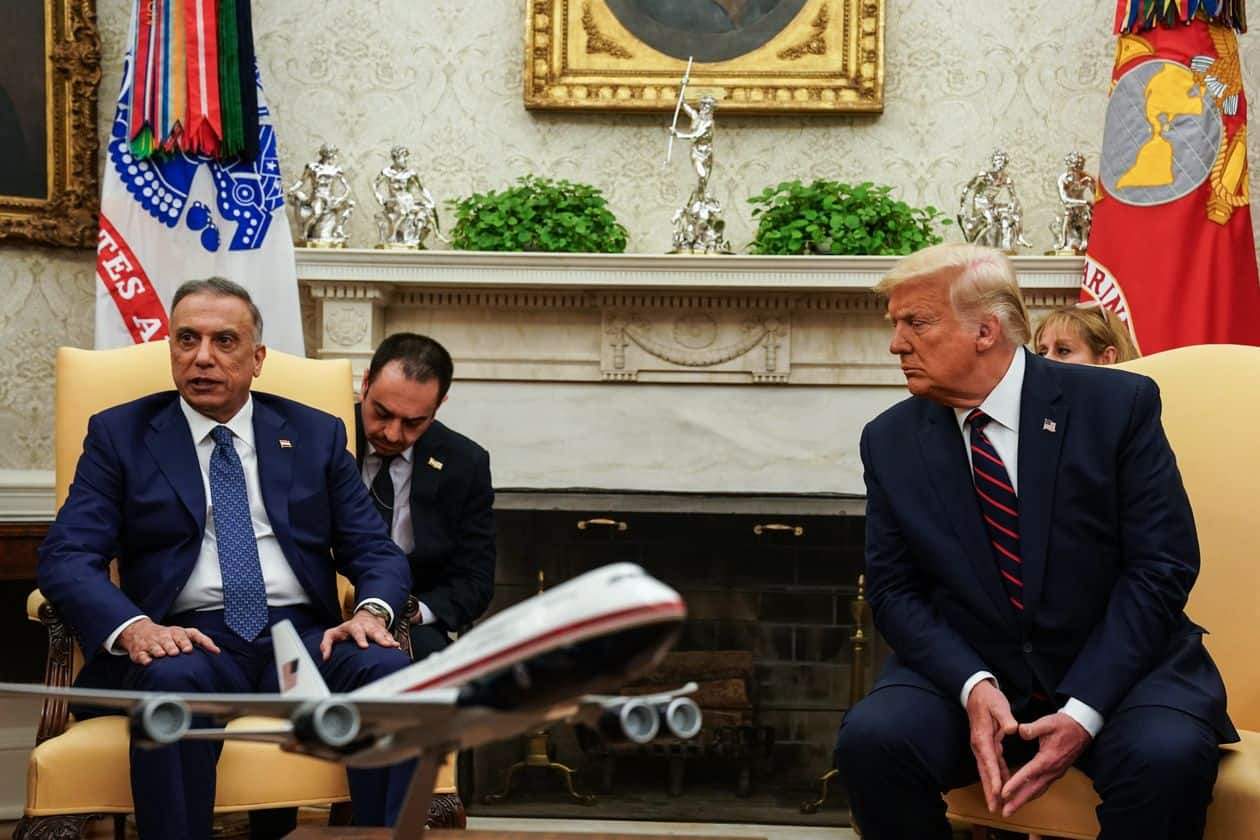With U.S. Backing, Iraq Pushes for Energy Rapprochement With Saudis

The Trump administration is urging Iraq to proceed with a project to connect its power grid with Saudi Arabia and other Gulf states, among steps to reduce Baghdad’s longstanding dependency on Iranian energy, U.S. and Arab officials said.
The grid-connection venture has been the subject of intensive consultations in recent months and was discussed during Iraqi Prime Minister Mustafa al-Kadhimi’s visit to Washington last week.
But now the parties are moving toward sealing and executing the component deals, which would mark a major rapprochement between Iraq and former Arab adversaries who clashed in the 1991 Persian Gulf War.
Iraqi Finance Minister Ali Allawi said Friday the project was “on the verge of being defined and designed and put out to tenders.” He told an Atlantic Council online seminar that Iraq’s electrical grid would probably be tied up to those of Saudi Arabia and Kuwait.
A Saudi energy minister spokesman confirmed that agreement “is advancing toward completion” and includes an option for a direct connection between Iraq and Saudi Arabia.
“It is vital that Iraq’s electricity grid be connected to the GCC,” added a senior Trump administration official, referring to the Gulf Cooperation Council, the six-member group of Gulf states. “We’ve been working on this.”
The grid tie-up is just one of a series of major energy ventures under discussion between Iraqi and Saudi officials.
Saudi Arabia has recently started talks on potential investments in the $2.2 billion Ar Ratawi project, which aims to redirect the large quantities of natural gas that Iraq wastes toward power generation, according to Mr. Allawi and a Saudi oil official.
Riyadh is also studying joint investments in solar energy within Iraq and exports of electricity from renewable projects in Saudi Arabia to supply Iraq, the Saudi energy minister spokesman added.
Last week, the U.S. and Iraq announced natural-gas and power-technology deals that are potentially worth $8 billion. They featured General Electric Co., Honeywell International Inc. and Stellar Energy, as well as plans with Chevron Corp. and Baker Hughes Co.
Iraq and its GCC neighbors, whose majority population belongs to different sects of Islam, have been at loggerheads in the past and long harbored suspicions about each other’s intentions.
During Saddam Hussein’s rule, Iraq invaded Kuwait in 1990. The attack set the stage for the Persian Gulf War the following year in which the U.S. and a broad coalition of Western and Sunni Arab states evicted the Iraqi troops from the Gulf state.
After the 2003 U.S. invasion of Iraq toppled its dictator, Saudi leaders often accused the Shia-dominated governments in Baghdad of siding with Iran, the kingdom’s main foe in the region.
Mr. Kadhimi’s selection as prime minister in May and the appointment of a new cabinet, however, had advanced Iraq’s quiet efforts to improve ties with Riyadh and other Gulf neighbors.
Those Iraqi efforts have dovetailed with the U.S. push to isolate Iran and reduce Baghdad’s dependence on Iranian gas and electricity.
Iraq has experienced chronic difficulties in meeting a mounting demand for electricity. Much of the problem has to do with a shaky distribution network, which is prone to blackouts. But Iraq’s problems have been exacerbated by subsidies and energy pilferage, which have deprived the government of revenue. Facing public unrest about power shortfalls, Iraq has imported Iranian electricity as a stopgap, creating stains with Washington.
Connecting the Iraqi and Gulf state grids has its challenges. The Iraqis will need to upgrade their electrical infrastructure so that their grid could accept the power flowing through the GCC system, noted one Western official, who said that work could take a year or longer.
The linkup would also be one of a series of steps experts say are needed to eliminate Iraq’s energy dependence on Iran. Iraq, experts say, also needs to reform its electricity sector by reducing subsidies so that income raised can be invested in power generation. The country also wants to capture and process the gas it wastes through flaring at its Ratawi gas hub to help meet domestic-energy requirements.
To expedite the linkup, U.S. officials helped facilitate meetings in recent months between Iraqi electricity and energy officials and counterparts in Saudi Arabia, the United Arab Emirates and other states, Mr. Kadhimi told reporters Thursday after meeting with President Trump.
“The Americans also encouraged us and encouraged our neighbors to link up our electricity generation grids,” Mr. Kadhimi said, speaking through an interpreter.
Meanwhile, the U.S. has given Iraq an exemption from sanctions against importing Iranian energy, largely because much of the country would plunge into darkness without it and because Baghdad is trying to reduce its dependence.
The new partnerships between Iraq, Saudi Arabia and the Gulf states mean Iraq’s “dependence on Iranian gas and electricity imports will begin to trail down significantly sometime next year,” Mr. Allawi, the finance minister, said.
At about $400 million a year, Iraq-Saudi trade remains small compared with Iraq’s bilateral trade with Iran, which exports $10 billion a year worth of goods to its western neighbor.
Apart from energy, Baghdad and Riyadh are also discussing the construction of a $1 billion, 100,000-seat sports stadium in Iraq to be funded by the kingdom and built by some of its contractors.
Mr. Allawi is also proposing that Kuwait delay or cancel some $3 billion that Iraq owes in reparations for the 1990-91 Gulf War when Hussein burned Kuwaiti oil fields. For his first trip abroad late May, the minister traveled to Saudi Arabia, seeking to revive proposed investments in Iraq’s embattled economy.
—Isabel Coles in Beirut and Summer Said in Dubai contributed to this article.
Photo: Iraqi Prime Minister Mustafa al-Kadhimi, meeting with President Trump on Thursday, said the U.S. had encouraged the linkup of Iraq and its neighbors’ electricity-generation grids. - PHOTO: ANNA MONEYMAKER/PRESS POOL




